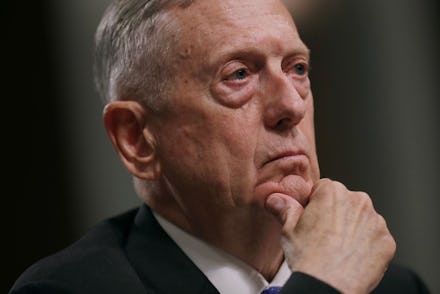North Korea: A timeline of Gen. James Mattis’ warnings on the nuclear threat posed by Kim Jong Un

U.S. Defense Secretary Gen. James Mattis wrote yesterday in a statement to the House Armed Services Committee, "The most urgent and dangerous threat to peace and security is North Korea."
North Korea's provocative behavior, including multiple projectile launches that include missiles and public celebration of increased weapons capabilities, is deeply concerning to the U.S.
Mattis explained that the "pace and scope" of the insular country's pursuit of both nuclear weapons and delivery capabilities was accelerating.
He said:
The regime's nuclear weapons program is a clear and present danger to all, and the regime's provocative actions, manifestly illegal under international law, have not abated despite United Nations' censure and sanctions.
Mattis warned that a war with the country would be "like nothing we have seen since 1953."
The new defense secretary has been consistent since his confirmation about his perspective on the looming threat of North Korea, and he has used multiple international forums to encourage a diplomatic resolution to the country's nuclear ambitions to prevent a possibly devastating war in the region.
He has spoken about North Korea publicly at least once per month since February, shortly after his confirmation on Jan. 20.
Feb. 2: Mattis speaks in South Korea
While speaking in South Korea about the controversial Terminal High Altitude Area Defense anti-missile system, a system developed by the United States and installed in South Korea, Mattis asserted the necessity of the system for protection against North Korea.
China objected to the system. But Mattis cited "provocative behavior" from North Korea, saying, "There is no other nation that needs to be concerned about THAAD other than North Korea if they're engaged in something that's offensive."
March 31: Mattis warns London
During a press conference in London reported by NBC News, Mattis said North Korea was proceeding in a "reckless manner" and needed "to be stopped."
The comments were a statement of concern, not in support of any specific policy outline.
April 18: Mattis emphasizes China's role while on Middle East trip
While traveling to the Middle East, Reuters reported that Mattis again raised concerns about North Korea.
Speaking with reporters about a missile test from the country, he said the U.S. was working with China to "try to get this under control and aim for the denuclearized Korean peninsula."
He called the failed North Korean missile test an attempt at provocation.
May 28: Mattis talks of a "catastrophic war"
Mattis said on CBS' Face the Nation, “The bottom line is it would be a catastrophic war if this turns into a combat if we’re not able to resolve this situation through diplomatic means.” He said a war with the country would be "probably the worst kind of fighting in most people’s lifetime."
June 3: Mattis tells Singapore that the threat is "urgent"
The Washington Post reported that Mattis told an audience on a trip to Singapore that North Korea represented an "urgent military threat."
He painted North Korea as a serious concern for South Korea and Japan's safety, offering a statement of support for China's "renewed commitment" to combating North Korea's nuclear ambitions.
U.S. strongly desires a diplomatic solution
North Korea does not yet possess the ability to send a nuclear weapon to the U.S. The country does represent an immediate security threat to its southern neighbor.
On May 19, Mattis told a Pentagon news conference, "If this goes to a military solution, it's going to be tragic on an unbelievable scale."
The U.S. currently has 28,500 troops stationed in South Korea to guard it from the looming northern threat.
Mattis strongly favors diplomacy over military action, saying, "Our effort is to work with the U.N., work with China, work with Japan, work with South Korea to try to find a way out of this situation."